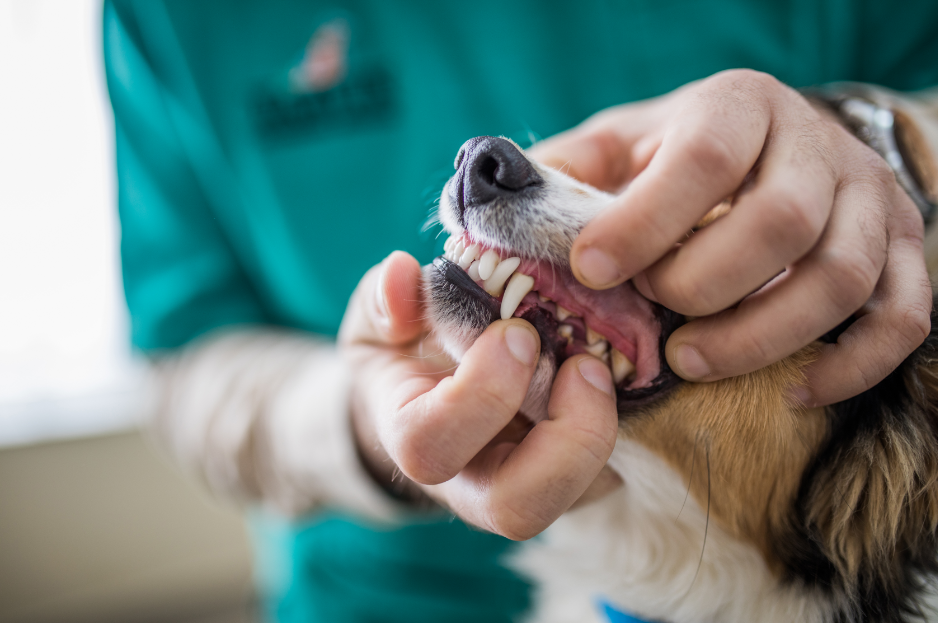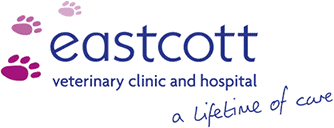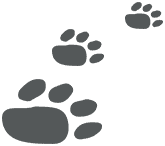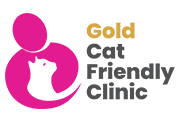Just like humans, dogs can experience a range of dental issues, highlighting the importance of dog dental care for their overall health and well-being. Neglecting oral hygiene can lead to more than just unpleasant breath; it can have significant health consequences for dogs. Dental issues can cause pain and discomfort, impacting their ability to eat, play, and find joy in life.
When you select Eastcott Vets for your dog dental care, you're selecting a dedicated partner prioritizing your dog's well-being. Our skilled team focuses on early detection and efficient treatment, ensuring prompt attention to your dog's dental needs. By integrating a regular dental care regimen into your dog's routine, you not only enhance their physical health but also promote a comfortable, joyful, and healthy life for them.

Different Types Of Dog Dental Issues
Dogs can develop dental issues due to various factors, including poor oral hygiene, diet, genetics, and lifestyle habits. Poor dog dental care can progress to dental disease, which is more severe and may manifest through a range of symptoms and diseases and infections, including:
Plaque and tartar buildup: Accumulation of bacteria on the teeth, leading to yellowish-brown deposits.
Gingivitis: Inflammation of the gums, often caused by plaque and tartar buildup.
Periodontal disease: Advanced stage of gingivitis where the infection spreads to the tissues and bones supporting the teeth.
Tooth decay: Resulting from bacterial action on the tooth enamel, leading to cavities.
Tooth fractures: Breakage of the tooth, often due to trauma or chewing on hard objects
Abscesses: Pus-filled pockets caused by bacterial infection in the gums or tooth roots
Oral tumors: Abnormal growths in the mouth, which may be benign or malignant
Malocclusion: Misalignment of the teeth or jaw, leading to bite problems.
Tooth root elongation: Overgrowth of tooth roots, which can cause pain and dental issues.
Oral ulcers: Open sores in the mouth, often resulting from trauma, infection, or systemic disease.
The Importance of Dog Dental Care
The repercussions of dental problems extend well beyond the mouth for dogs. Neglected dental hygiene can result in infections, tooth loss, and even systemic disorders if left untreated. Bacteria from dental issues can enter the bloodstream, leading to systemic infections that affect vital organs like the liver, kidneys, and heart.
To prevent such complications, regular dog dental care is crucial, involving both professional cleanings and at-home maintenance. Prioritising your dog's dental health not only enhances their oral well-being but also improves their overall quality of life. By ensuring proper dog dental care, you safeguard your dog from discomfort and the potential dangers associated with dental issues. A happy smile reflects a healthy pet, and investing in your dog dental care can contribute to a longer, more satisfying life for your furry companion.
Signs of Dental Disease In Dogs
- Persistent Bad Breath: Foul and persistent bad breath is often a clear indicator of dental disease caused by the accumulation of bacteria in the mouth.
- Visible tartar and plaque: You might observe a notable buildup of yellow or brownish tartar on the teeth, indicating visible tartar and plaque.
- Red, Swollen Gums: Red and swollen gums, characterised by inflammation, can exhibit redness and swelling, often accompanied by bleeding upon touch.
- Pain or Discomfort: Dogs experiencing inadequate dental care may display signs of pain or discomfort, including whining, whimpering, or reluctance to eat.
- Behavioral Changes: Changes in behavior may manifest in dogs, such as irritability or avoidance of mouth touching. They might also paw at their faces or mouths in an attempt to alleviate discomfort.
- Loose Teeth: In severe instances of neglected dog dental care, they may experience loose teeth or even tooth loss.
- Difficulty Eating: Difficulty eating can serve as a notable indicator that something may be amiss with your dog's oral health. Dogs may struggle to chew their food, resulting in reduced appetite and potential weight loss.
How Can I Help My Dog Dental Care?
As a responsible pet owner, there are several straightforward yet effective steps you can take to ensure your dog's oral hygiene remains in good condition. Regular brushing with a toothbrush designed for dogs helps eliminate plaque and prevents dental problems from developing. Aim to brush your dog's teeth at least two to three times per week, if not daily. Additionally, offering dental chews or toys specifically made to support dog dental care can aid in tartar removal while serving as a tasty treat for your dog.
Consistent veterinary check-ups are essential for early detection of any dental issues. The team at Eastcott Vets can provide professional cleanings and tailored advice, especially if your pet is prone to dental problems. Lastly, pay attention to your dog's diet by selecting high-quality, dental-friendly foods that encourage chewing and maintain oral health. By incorporating these practices into your routine, you play a vital role in ensuring your canine companion enjoys a happy and healthy life.
Set Up Your Dog Dental Care Plan Today!
Dog dental care is crucial for their overall well-being. By integrating these practices into your daily routine and collaborating closely with the experts at Eastcott Vets. By integrating these practices into your daily routine and collaborating closely with the experts at Croft Vets, you can contribute to ensuring your dog maintains excellent oral health and a joyful, pain-free smile throughout their life. Get in touch or schedule an appointment today.
We also offer dental care for cats and rabbits. Find out more.





